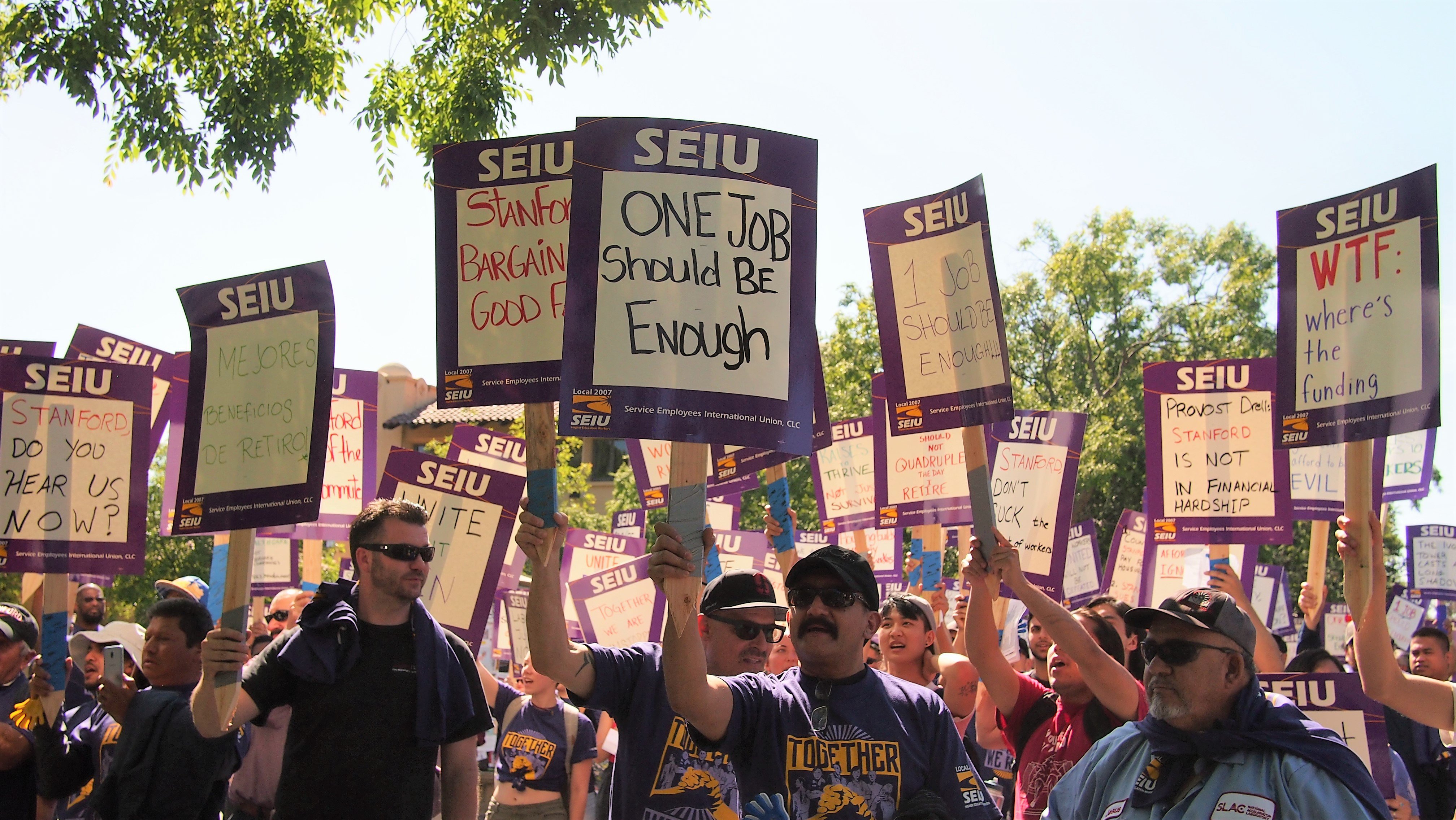Stanford students rallied with the Service Employees International Union (SEIU) Local 2007, the on-campus workers’ union, in honor of May Day — a holiday celebrating the international labor movement — and to support workers during their upcoming contract negotiations with Stanford University.
Students, community members, workers and their families gathered at White Plaza on May 1. After announcements and performances by Taiko and the Stanford Band, the large group marched toward University President Marc Tessier-Lavigne’s office, where they presented a petition and a list of demands.
The rally follows a string of workers’ rights efforts on campus, including rallies initiated by SEIU and protests held by Stanford Coalition for Planning an Equitable 2035 (SCoPE 2035). 2020 U.S. presidential candidate Julian Castro ’96 and former U.S. Secretary of Housing and Urban Development (HUD) also attended an SEIU meeting in March to show his support for workers’ rights.
At the May Day rally, union members wore purple SEIU Local 2007 t-shirts. The Campus Workers’ Rights Coalition passed out small purple felt pins for students to wear. Taiko drummers also dressed in purple t-shirts in solidarity, with one member saying, “Today we’re called Taiko Purple.”
Johannes Raatz, a full-time organizer at Local 2007, thanked students for coming out and for organizing teach-ins about workers’ rights. Raatz said that while the exact conditions of contract negotiations will not be available to the public until SEIU Local 2007 presents them to the university this summer, in general workers are demanding significant wage increases, affordable housing on campus, restrictions on temporary or contract workers that allow Stanford to avoid paying full-time workers, minimum wage floors at a liveable wage, reduced copays for healthcare and healthcare for retirees.
With regards to the upcoming negotiations, University spokesperson E.J. Miranda has previously said that the Board of Trustees “[looks] forward to collaborating with SEIU Local 2007 in positive and good faith negotiations to reach an agreement on a new contract.”
Comparative literature professor David Palumbo-Liu called for solidarity between students and campus employees and said that the issue at hand is a matter of “the erosion of the quality of life” for service workers. He spoke about the extensive daily commutes many workers make from the Sacramento area as an example of service workers’ current struggles.
Campus workers shared their stories throughout the rally. One described his experience as a college graduate and Mexican immigrant. He spoke about how his family struggles to feed themselves, and said his wife has not been able to visit a doctor in years because they lack affordable health care.
A member of the local janitorial workers’ union was also present and spoke in full support of their contract negotiations. A pastor from an East Palo Alto church added that the community in East Palo Alto has seen many people “leaving in droves” to move to the Valley in search of more affordable housing.
Students at the event led a discussion about the issues workers face, including unsafe conditions, long commutes, harassment, unaffordable housing, understaffing and job insecurity. Many campus workers are women and people of color and are at a high risk of facing discrimination.
Students from SCoPE 2035 also shared a bilingual message about the invisible labor that campus workers perform and said that Stanford must pay attention to the whole community, including service workers. Last week, the Campus Workers’ Rights Coalition held a teach-in to educate students about campus workers’ experiences and the campaigning for contract negotiations.
The group emphasized that students have the unique ability to put pressure on Stanford’s administration.
“We have a lot of privilege as students that workers do not have,” said former ASSU Undergraduate senator Jianna So ’21.
Jose Escañuela, president of the negotiations team, said that the student’s participation in the rally shows that “we are not alone.”
“We’re fighting for a living wage, better healthcare, and job security,” wrote SEIU in a press release. “As a world class institution founded on the mission to ‘promote the public welfare by exercising an influence in behalf of humanity and civilization,’ Stanford can lead the way in providing world class working conditions.”
Contact Nohemi Davila at nohemi ‘at’ stanford.edu.
